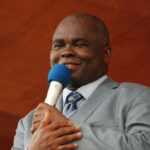As a youth, one of the admirable attributes I passionately desired to inherit from my late father, “the quintessential Right Honourable Gentleman,” Pa Julius Njonye Nkemdiche, was his ready graphic approach in addressing issues, no matter how complex the situations might have been. Every specific engagement with him left you with an enduring pictorial.
In my teenage years, I came to regard him as a master of graphics. Without fail, he effortlessly drew colourful pictures with simple words in the minds of his audiences. On one occasion when my youngest sister, (Uchechukwu – now in Abraham’s bosom), took seriously ill, our parents advised her to consider temporarily returning to the family house to better shield her barely five-year-old first child from the hazards of her illness. She complied.
However, the envisaged “temporary return” was everything but. My sister’s illness proved inaccessible to available medical advice. In the interval, her son basked in the typical oversupply of affections by grandparents. Twelve months and counting, the young mother and son had still not returned whence they came. The concerned father visited our house to engage my father on the advisability of taking his son. As methodical as ever, my father insisted on consulting the lad’s feelings on the proposal. The lad dismissed it out-of-hand, making him cry. His father was alarmed, transfixed, with his eyes darting from grandfather to grandson and back.
Correctly reading the statuesque figure, my father promptly asked the sulking lad to fetch a piece of paper and a pencil. When the lad returned, my father instructed him to write his full name in capital letters on the piece of paper. Bending over a centre-table and looking with nonplus eyes, the lad wrote his first, middle and last names on the paper in caps. In his turn, my father demonstratively looked from the piece of paper to the alarmed dad and back. The frozen personage slowly began to thaw. The message had registered. The graphic artist uttered not a word.
On another occasion, when the narrator himself was barely a five-year-old lad, my father had favoured his children with one of his many instructive anecdotes. On that occasion the anecdote had to do with two popular young brothers. These were very devoted servants. The one served a powerful and wealthy king, while the other was a servant of God. With an eye on the austere material circumstances of the latter, the former routinely suggested to the latter to consider seeking employment in the palace, to which God’s devout servant always stoutly dismissed, declaring “I cannot abandon my services to God because of mere man.” That declaration soon became known across the kingdom. When it first carried to the most powerful ears in the kingdom, the king had been indifferent. But with the growth of the evangelical voice, the king and some of his more haughty courtiers persuaded themselves that the words, “mere man”, in the telling declaration constituted a subtle affront on monarchical stature. If left unchecked, they reasoned among themselves, the king would ultimately become equated, in peoples’ minds, with his subjects, thereby demystifying the monarchy. They consequently decided to check the declaration.
A royal decree was thus issued: At the next yam-festival celebrations, the two well-known brothers were invited to parade themselves on stage in all their glories, as proof of the powers of their respective masters. The king then privately instructed that thenceforth royal ornaments (gold, pearls, beads, etc.) were to accompany the daily victuals-package to his royal servant. But this was unknown to the servant; so as was his wont, after helping himself he would casually send what was left of the package to his comparatively indigent brother. Thus things stood until on the eve of the much-expected exhibition.
On exhibition day, the entire kingdom gathered at the expansive palace grounds. The king, his extensive family and court were majestically dressed and seated on a raised platform, radiating exquisite splendour and confidence in equal measure. A decorated wooden stage stood at the centre of the grounds.
As the sun approached zenith the king raised his royal spectre to signal the commencement of the exhibition proper. The royal servant was first to appear, smiling confidently, decked in his purpose-made apparel. He exuded health and wealth; unknowing persons in the crowd could easily have mistaken him for royalty. The crowd cheered and applauded, chanting praises in honour of the king. On the raised platform there were visible mixed reactions. The king and his close confidantes exchanged curious glances… “Some persons have been stealing the royal ornaments!” They were apparently thinking when the crowd suddenly erupted in a thunderous, “CHUKWUEBUKA!!!” God’s servant had emerged amidst blinding radiance from royal ornaments! Humiliated, the king and his confidantes quickly stole away from the grounds.
Naturally enough, a logical man would find it irresistible to ask a number of questions in the sequel. Firstly, he would wonder why the king didn’t specifically inform his loyal servant of the ornaments beforehand; or, secondly, he would puzzle at why the king didn’t instruct that the victuals and the ornaments be separately packaged; thirdly and better still, he would ask why it was that the king didn’t direct that the single daily victuals package be so arranged that the ornaments be accessed before the victuals proper; fourthly, and most puzzling of all, he would wonder why it didn’t cross the king’s exhibition-focused mind to inquire of his loyal servant, whether or not he was receiving the royal ornaments, more so seeing that the unusual gifts hadn’t been acknowledged. One answer fits the four questions, and it’s encapsulated in the spontaneous thunderous eruption at the palace grounds, “CHUKWUEBUKA!!!” God Almighty had evidently temporarily confounded the conceited king, simply to reassert that the world and the fullness thereof belong to Him. Didn’t the Holy Writ proclaim that the “minds of kings are in His hands”?
How graphic. Moral: the mighty and the humble, Fear God. The quintessential Right Honourable Gentleman took his last bow in June 1986, some 35 years since, but the impact of his graphic presentations still endures, with its concomitant rich blessings. Bless his gentle soul. Mayst my fellow compatriots in particular and the rest of humanity in general, feel impelled to renew their fear of God in 2022.
Afam Nkemdiche is an engineering consultant in Abuja.













